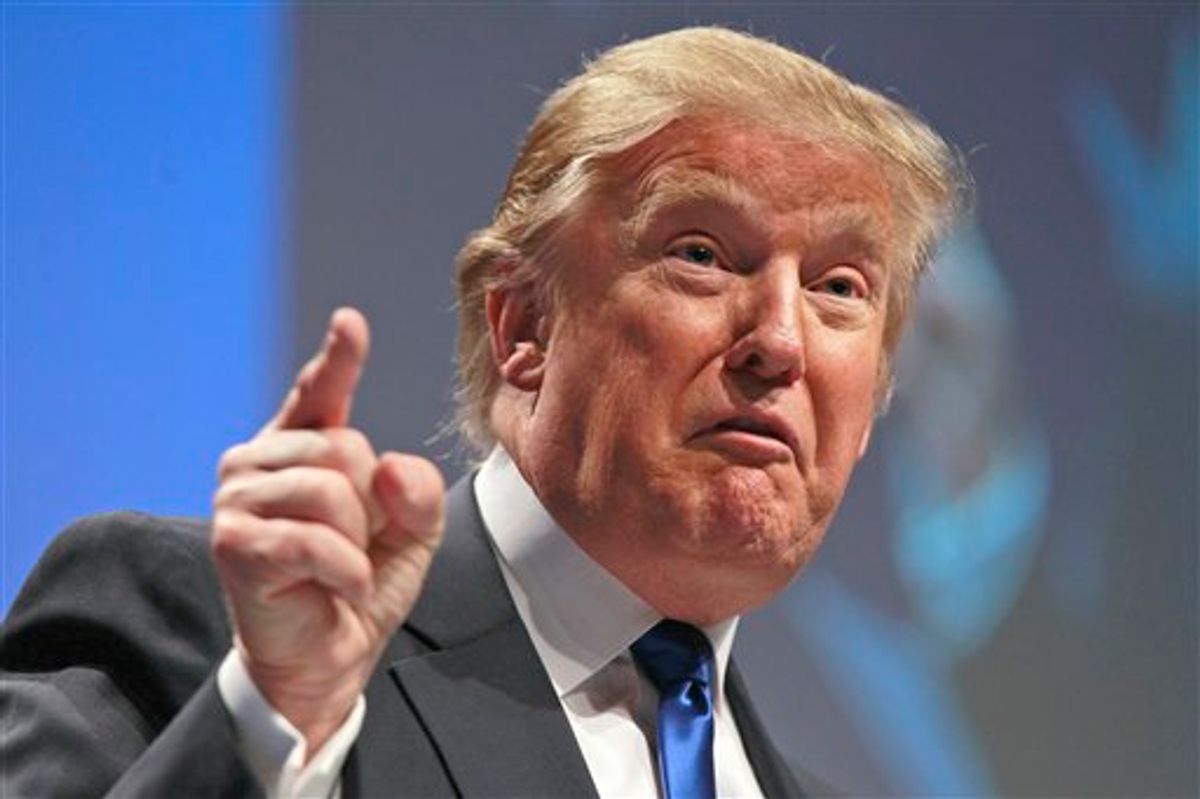First, a reminder: If you haven't yet entered our $184.27 Donald J. Trump Challenge, it's not too late -- we'll be accepting entries through next week.
In case you missed yesterday's unveiling, the rules are simple: I'm putting up my entire savings account -- a whopping $184.27 -- on the proposition that Trump's presidential aspirations are utterly phony. To win my life savings, just send an essay of no more than 500 words (and much less, if you want) to TrumpChallenge@salon.com explaining why we should take him seriously. We'll publish the best submission, and if Trump's name appears on the New Hampshire primary ballot next year (and he's an active candidate on primary day), then the writer will get all my money.
We've received several promising submissions so far, but one email that caught my eye came from someone who didn't want to enter the contest. Paul Riddell from Texas wrote that he agreed Trump's "campaign" is a publicity stunt, not just because he did the same thing back in 2000 (as I detailed yesterday) but because he also did it in the 1988 cycle:
Does nobody remember when Trump first showed up in 1987, right about the time the Gary Hart/Donna Rice scandal was starting, and the first thing he was doing was denying he was running for President? A-MAZ-ingly, it was all hype to sell both his horrible book _The Art of the DeaL_ but also the even worse board game of the same title. (With the latter, Trump was savvy enough to make sure that the board game was sold as non-returnable, and I remember quite a few stores in my area that had copies on the shelves for years. I remember one grocery store that ordered five copies, and they were still sitting on the shelves in 1995, marked down to $6 and affixed with "$5 off" coupons.)
This was news to me, but it turns out it's true: The Trumpster's first fake presidential campaign actually took place 24 years ago, just after he almost single-handedly blew up the USFL and when he was still on his first wife.
Then 41, Trump was emerging as an icon of the '80s, celebrated by Newsweek as "the latest of a breed unique to the decade: the businessman who becomes larger than life, like a star athlete or a popular actor." (This, of course, was before the whole bankruptcy thing Trump dealt with in the early '90s.) As such, he was handed a deal to write the aforementioned "Trump: The Art of the Deal." Publication was set for November 1987.
And wouldn't you know it, a few months before the book's release, stories began appearing that Trump -- seemingly out of nowhere -- might jump into the 1988 presidential race as a Republican. The chatter began in the middle of July, when a Republican leader in New Hampshire floated the idea of drafting Trump, who expressed obligatory surprise and humility: "Anyone would be honored to hear this." Then he swung into action, taking out ads in major newspapers addressing topics ranging from the deficit to nuclear weaponry to Central America. And he scheduled a speech in New Hampshire, to the Rotary Club in Portsmouth -- the same venue that GOP candidates Bob Dole, Pat Robertson and Jack Kemp had already spoken before. Here's how the New York Times wrote up the event:
Mr. Trump's visit to New Hampshire, which he made in his sleek black French-made military helicopter, also drew widespread interest from the press, with more than 20 newspaper and television reporters covering his speech.
In his emotional talk Mr. Trump castigated Federal officials for not making American allies like Japan, Saudi Arabia and Kuwait pay more for military defense. If they paid their fair share, Mr. Trump insisted, the huge Federal budget deficit could be eliminated.
The speculation kicked up. It was late in the game. Vice President George H.W. Bush was the clear Republican favorite, and Iowa and New Hampshire were just months away, but with his money and bluster, Trump was portrayed as a potential wild card. He denied that he was running -- always leaving enough wiggle room to keep the media playing along. "The politicians go up and get a moderate audience," he bragged after his Rotary Club speech. "I go up and they're scalping tickets. You heard that? They're scalping tickets. Why? Because people don't want to be ripped off, and this country is being ripped off. I think if I ran, I'd win."
There was plenty of awkwardness too. Even though he was a registered Republican, Trump had donated extensively to Democratic politicians and committees -- so much that then-Speaker Jim Wright and then-DSCC chairman John Kerry asked him to host the annual Democratic Congressional Dinner even as he was pretending to explore a GOP White House bid. Trump declined.
Not long after the Rotary speech, "The Art of the Deal" hit bookstores. It was a runaway hit. And with that, the trips to New Hampshire and the flirtations with the '88 race stopped. He'd already accomplished his goal: enhancing the Trump brand. When Iowa and New Hampshire rolled around, he was immersed in the planning for a major boxing match in Atlantic City.
12 years later, with another book to promote, he did it all over again. And now, 12 years after that, he's back again. I'm feeling more and more confident that my bank account is safe.

Shares